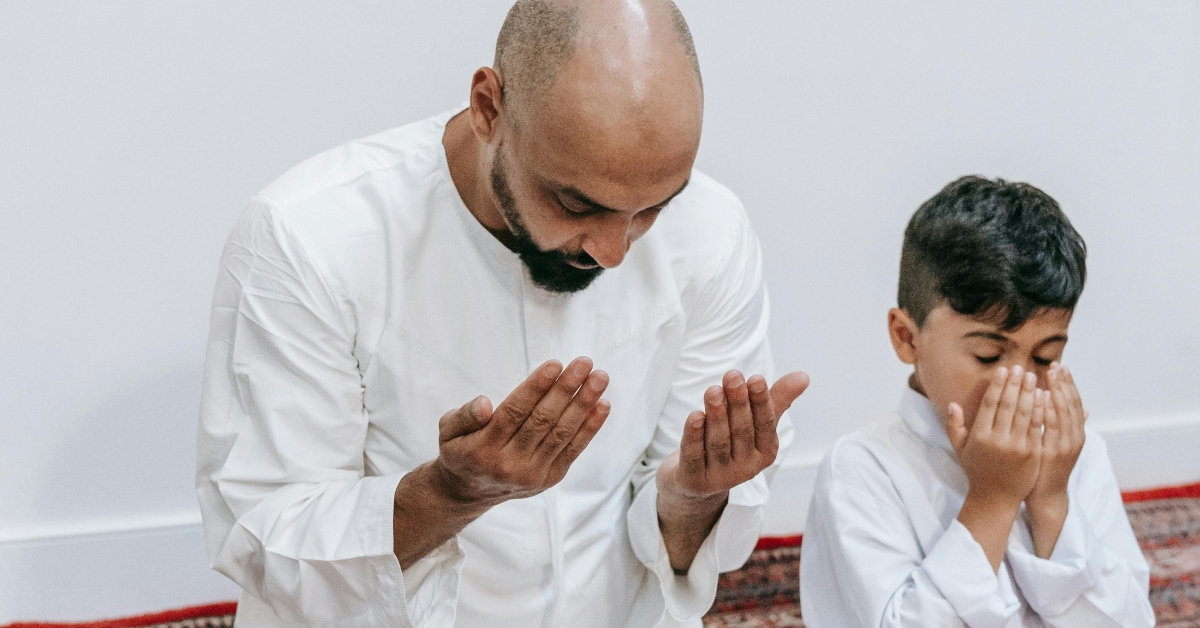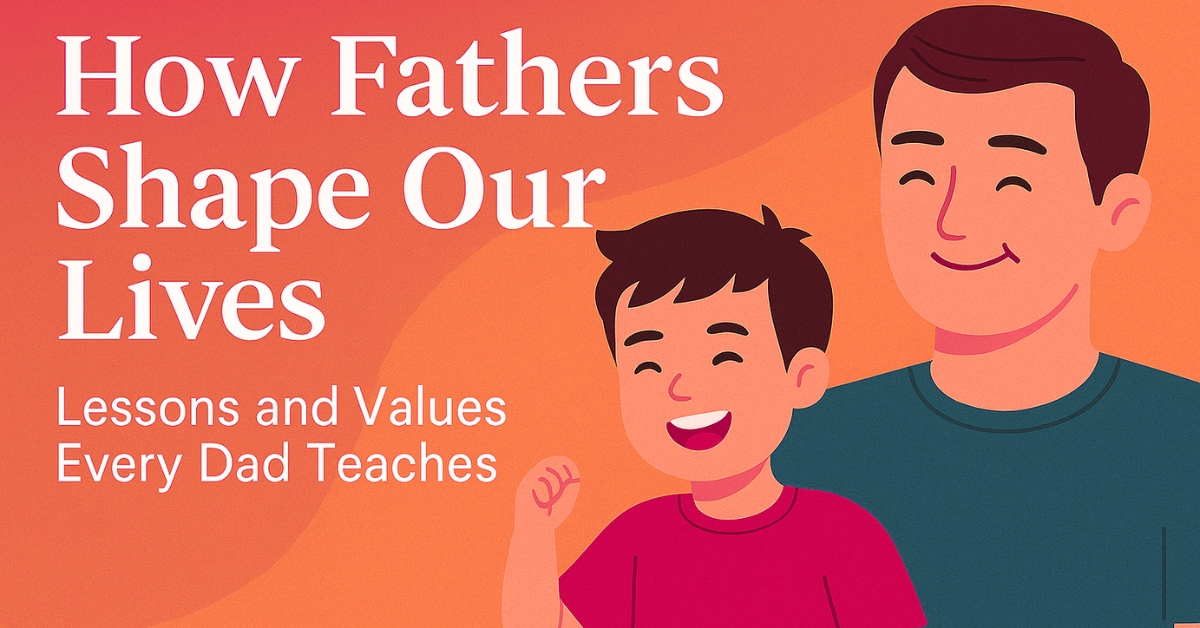Introduction
Fathers have a powerful influence on who we become. From our earliest memories, their presence—or absence—leaves lasting marks on our hearts and minds. While mothers are often seen as the source of comfort and nurturing, fathers usually represent structure, guidance, and the outside world. In many ways, how fathers shape our lives is one of the most important but least understood parts of growing up.
Think about it. A father’s smile after a child’s success can build confidence that lasts a lifetime. On the other hand, a lack of attention or approval can create self-doubt that follows us into adulthood. Psychologists call this dynamic a “blueprint of identity.” It starts in childhood but continues to influence our choices, our relationships, and even how we see ourselves as adults.
The lessons learned from dad often come in simple moments. It might be the way he taught us to ride a bike, the discipline he showed at work, or the respect he gave to others. These small actions often become the building blocks of resilience, honesty, and perseverance. Many adults in the United States can point to values or habits they practice today that were first modeled by their fathers.
For daughters, fathers play an especially unique role. A supportive dad can show his daughter that she is worthy of respect and love. He can teach her to trust herself and to expect kindness in her relationships. When fathers are absent, critical, or emotionally distant, however, daughters may carry what experts call the “father wound.” This can show up later in life as a struggle with self-worth or a pattern of choosing emotionally unavailable partners.
Sons also learn deeply from their fathers. Often, a father becomes the first role model for what it means to be a man. Boys may imitate their father’s work ethic, his integrity, or even his way of handling stress. Sometimes they repeat mistakes as well, carrying forward strictness or emotional distance into their own families. This is why a father’s influence on life does not stop with one generation—it ripples across many.
Beyond emotional lessons, fathers also pass on practical knowledge. How dads teach life skills can range from basic tasks like fixing things around the house to important guidance on money management or problem-solving. These lessons give children a sense of independence and competence. Even when fathers are strict, many children later realize that the structure helped them develop discipline and perseverance.
But not all lessons are easy or positive. Many adults grow up with feelings of not being “enough,” a sign of what psychologists describe as the father wound. This wound is not always caused by big, dramatic events. Sometimes it comes from small but repeated moments of disconnection—when love felt conditional, when approval was hard to earn, or when the father was simply absent. The result can be perfectionism, people-pleasing, or emotional distance in adult life. In these cases, dads instill the impact of fatherhood even when they don’t intend to.

Still, the story of fatherhood is not only about wounds. It is also about strength, resilience, and role modeling. Many fathers act as guides who show their children what it looks like to balance work, family, and personal responsibility. A father who admits his mistakes teaches humility. A dad who cheers for his child’s effort instead of only the result teaches perseverance. These role model lessons are remembered long after childhood.
Modern psychology and neuroscience confirm what many families already know: fathers matter. Studies show that children with supportive fathers often grow up more confident, more resilient, and more successful in relationships and careers. On the other hand, the absence of a father—or a painful father-child dynamic—can leave challenges that require healing in adulthood.
At the heart of it all lies a simple truth: dad taught me values that shaped who I am today. Sometimes these values come through words, but more often they come through actions, habits, and presence. A father’s love, guidance, and even his silence become part of the inner voice a child carries for life.
This article will explore these powerful influences. We’ll look at the different ways fathers shape identity, the life skills and values they pass on, the wounds they may leave, and the opportunities to grow beyond them. In doing so, we’ll uncover both the challenges and the deep, lasting gifts of fatherhood.
This article will explore these powerful influences. We’ll look at the different ways fathers shape identity, the life skills and values they pass on, the wounds they may leave, and the opportunities to grow beyond them. In doing so, we’ll uncover both the challenges and the deep, lasting gifts of fatherhood.
How Fathers Shape Our Lives
When we talk about how fathers shape our lives, we are talking about one of the deepest and most long-lasting influences in human development. A father is not just a provider or a disciplinarian—he is often the first role model, the first mirror of validation, and the first teacher of life skills. Whether he is present or absent, warm or distant, supportive or critical, the role of a father leaves marks that stay with us long after childhood.
Fathers as the First Role Models
Children learn not by listening to lectures but by watching behavior. From a young age, both sons and daughters look to their fathers for clues about how to navigate the outside world. This is why father as role model lessons can be so powerful.
- A father who shows kindness and respect teaches his children to value empathy.
- A dad who works hard but still makes time for family shows balance and responsibility.
- A father who admits his mistakes models humility and accountability.
These everyday choices often mean more than formal lessons. Long after childhood, adults recall their father’s tone of voice, the way he handled conflict, or how he celebrated victories. These role model lessons become part of the child’s inner voice.
Emotional Foundations: Confidence, Safety, and Self-Worth
- A father’s approval or disapproval is deeply coded into the psychological blueprint of a child. When a father offers consistent love and encouragement, children often grow up with a strong sense of self-worth. They feel capable of taking risks, facing failures, and trying again.
- But when love feels conditional—when it depends only on success, obedience, or perfection—the child learns a different lesson: “I am valuable only when I perform.” This belief can lead to perfectionism, workaholism, or fear of failure later in life.
For many, the inner voice they carry into adulthood sounds like their father. It might be a supportive voice—“You can do this, I believe in you”—or a critical one—“You’ll never be good enough.” Either way, the father’s influence becomes part of how we motivate ourselves, how we handle stress, and how we interpret success or failure.
Lessons Learned From Dad: Everyday Wisdom
Some of the most important lessons learned from dad are surprisingly simple:
- “Don’t give up after the first failure.”
- “Be honest, even when it’s hard.”
- “Treat others the way you want to be treated.”
- “Work hard, but remember to rest.”
These small pieces of wisdom often shape big life decisions. For example, someone whose father taught perseverance may carry that lesson into their career, staying strong through challenges. Another person whose father modeled integrity may refuse to compromise their values, even when faced with pressure.

The beauty of these lessons is that they don’t require a father to be perfect. Children often learn just as much from observing struggles as they do from successes. A father who kept going through hard times can be just as inspiring as one who achieved great success.
How Dads Teach Life Skills
One of the most practical yet overlooked roles of a father is passing down skills that prepare children for adulthood. How dads teach life skills often looks ordinary at the time but carries long-term value.
- Teaching a child how to fix a bike builds problem-solving confidence.
- Showing them how to budget money creates financial responsibility.
- Coaching them through sports teaches teamwork and discipline.
- Guiding them in conflict resolution prepares them for healthy relationships.
These life lessons don’t just make children more capable; they also create lasting memories. Many adults recall the pride they felt when their dad taught them to change a tire, grill a meal, or solve a tough math problem. These moments strengthen bonds while building independence.
The Father’s Influence on Daughters
The relationship between a father and daughter is often described as the blueprint for how she will approach future relationships. A supportive father teaches his daughter that she deserves respect and love. He helps her develop confidence in her abilities and trust in her instincts.
When fathers are absent or critical, however, daughters may struggle with self-worth. They may seek validation from partners who mirror the same emotional distance they experienced at home. Psychologists call this dynamic part of the “father wound,” a pattern that often repeats until it is recognized and healed.
This is why the father’s influence on life is so crucial for daughters. A father’s encouragement can empower her to pursue education, leadership, and healthy partnerships. His respect sets the standard for how she expects to be treated by others.
The Father’s Influence on Sons
For sons, fathers often serve as role models for how to navigate manhood and responsibility. A father who demonstrates patience, courage, or integrity teaches his son to carry those traits into adulthood. A father who communicates openly shows his son that strength includes vulnerability. But just like with daughters, the absence of a supportive father can create struggles. Sons of distant or authoritarian fathers may grow up confused about authority, unsure whether to obey it blindly or rebel against it. Some may overcompensate by becoming overly strict themselves. Others may avoid responsibility altogether. This shows how dads instill impact of fatherhood not just directly, but through patterns that repeat across generations. Sons often become the kind of fathers their fathers were—unless they consciously choose a different path.
The Subtle Power of Presence and Absence
It’s important to recognize that fathers shape lives not only through their actions but also through their presence—or lack of it. A father who shows up consistently, even in small ways, builds trust and security. A father who is emotionally or physically absent leaves an emptiness that children may spend years trying to fill.
Absence can create wounds, but awareness can create healing. Many adults who grew up with absent fathers find strength in breaking the cycle, choosing to be present and engaged parents for their own children. In this way, the impact of fatherhood continues, but it can be reshaped into something healthier.
Dad Taught Me Values
When people reflect on their fathers, one phrase often comes up: “Dad taught me values.” These values might be honesty, kindness, responsibility, or perseverance. Even fathers who weren’t perfect often managed to pass down core lessons that shaped their children’s lives.
For example:
- A father who insisted on fairness taught integrity.
- A dad who pushed through challenges taught resilience.
- A father who respected others taught empathy.
These values become the moral compass children carry into adulthood, guiding them through challenges, relationships, and career choices.
Father Archetypes and Their Lasting Influence
Not all dads are the same. Still, many fathers share common patterns in how they raise their children. Psychologists call these patterns father archetypes.
These archetypes explain a lot about how fathers shape our lives. Some bring love and guidance. Others create challenges that children carry into adulthood.
Here are the most common archetypes and what they leave behind.
The Nurturing Father
This dad is warm and caring. He listens. He comforts. He shows love openly.
Positive impact: Kids grow up confident and emotionally secure. They feel safe sharing feelings.
Challenge: Too much protection can make children dependent and less independent.
When people recall lessons learned from dad, this father often comes to mind. He is remembered for kindness and unconditional support.
The Disciplinarian Father
This dad believes in rules. He values respect, structure, and order.
Positive impact: Kids raised by disciplinarian fathers often learn discipline, responsibility, and hard work.
Challenge: If rules are too strict, children may feel afraid, anxious, or pressured to be perfect.
For many, when they say “dad taught me values,” it reflects this type of father. Honesty, duty, and persistence often come from him.
The Absent Father
Some dads are missing. Sometimes they leave the family. Sometimes they are present physically but emotionally unavailable.
Impact: This absence often creates what experts refer to as the father wound. Children may feel insecure, unloved, or constantly seeking approval.
Possible growth: Many rise above this pain. They build strength and choose to become better parents for their own kids.
The absent father reminds us that a father’s influence on life is felt even when he isn’t there. His absence itself shapes identity.
The Playful Father
This dad is fun. He laughs, plays, and creates adventures.
Positive impact: Children often become creative, curious, and confident.
Challenge: If there is only play and no structure, kids may lack boundaries.
Memories of trips, games, and laughter show how dads instill the impact of fatherhood through joy, not just rules.
The Provider Father
Many fathers view their primary role as providing for their family. They focus on work, money, and stability.
Positive impact: Kids learn the value of sacrifice and responsibility. They respect hard work.
Challenge: If the father is always working, children may feel emotionally distant from him.
This archetype shows how dads teach life skills like ambition, financial discipline, and perseverance.
The Inspirational Father
This dad pushes his children to dream big. He inspires them to believe in themselves.
Positive impact: Kids often grow up ambitious, motivated, and self-confident.
Challenge: If pressure is too high, children may feel stressed or afraid to fail.
These are the role model lessons many remember: “You can do anything if you try.”
Fathers Often Blend Roles
Most dads are not just one type. A father may be nurturing at times, strict at others, and also a provider. These archetypes are patterns, not fixed boxes.
The most powerful fathers are those who find balance—mixing discipline with love, work with presence, and guidance with freedom.
Healing From Difficult Archetypes
- Not all archetypes feel positive. Some leave wounds. Yet healing is possible.
- Children of absent fathers often become very present parents.
- Children of disciplinarians may grow into empathetic leaders.
- Children of providers may learn to value emotional closeness as much as financial stability.
By noticing these patterns, adults can choose which lessons to keep and which cycles to break.
The Father Wound: Healing and Growth
Not every dad leaves behind happy memories. For many people, the relationship with their father is complicated. Some grew up with strict discipline but little affection. Others had a father who was emotionally distant or completely absent. These experiences can leave what psychologists call the father wound.
The father wound is not always visible. It shows up in subtle ways—low self-esteem, trouble trusting others, or feeling “not enough.” But the good news is that wounds do not have to last forever. Healing is possible. Growth is possible.
What Is the Father Wound?
The father wound is the emotional pain that comes from a lack of safety, love, or connection with one’s father. It can appear when a dad is:
- Absent or missing from the family
- Emotionally unavailable even if physically present
- Overly strict or critical
Uninvolved in teaching or guiding
This wound often shapes how children see themselves. It influences relationships, career choices, and even parenting styles. In other words, the father’s influence on life continues long after childhood—both in positive and negative ways.
- Signs of the Father Wound
- Adults carrying the father wound may notice:
- Constantly seeking approval or validation
- Difficulty trusting authority figures
- Fear of failure or rejection
- Trouble forming healthy relationships
- A drive to overachieve or, on the other side, a lack of motivation
These struggles often trace back to early experiences. The absence of love or guidance leaves a gap. That gap becomes a wound.
Healing the Father Wound
Healing takes time, but it is possible. Here are some ways people begin to recover:
Acknowledge the Wound
Healing starts with honesty. Many adults first need to admit: “Yes, my father hurt me or wasn’t there for me.” Denial only makes the pain last longer.
Seek Healthy Male Role Models
Even if a biological father was absent or difficult, other men—uncles, teachers, coaches, mentors—can step in. These role models show us new ways of living and remind us that dads instill impact of fatherhood not only through biology but through presence.
Therapy and Support
Speaking with a counselor helps unpack childhood experiences. Support groups also create safe spaces where people share stories and find connection.
Self-Reflection and Forgiveness
Not all fathers had the tools to be present. Many were dealing with their own wounds. Forgiveness—when it feels right—does not excuse the pain but frees the child (now adult) from carrying endless anger.
Create a New Legacy
One of the most powerful steps is deciding to parent differently. Adults can take the pain they experienced and turn it into motivation to break the cycle. When they say, “dad taught me values,” it may not mean their father modeled them perfectly. Instead, it can mean they learned what not to repeat.
Growth After the Wound
Surprisingly, the father wound can also create strength. Many who suffered from absence or neglect grow up with:
- Strong independence
- Deep empathy for others
- A passion for building healthy families
- Determination to succeed despite hardship
These qualities prove that pain can transform into growth. What begins as a wound can become fuel for resilience.
Lessons Beyond Pain
Even difficult fathers leave lessons. Sometimes those lessons come from what they did wrong. A child of a critical dad might learn the importance of kindness. A child of an absent dad may grow into the most present, loving parent. This is another way how fathers shape our lives—through both presence and absence, guidance and mistakes.
Moving Forward
The father wound is real, but it does not have to define a person forever. Healing is possible through self-awareness, therapy, healthy relationships, and a conscious choice to create a new legacy. In the end, growth comes when we take the pain and turn it into purpose. We learn not only from our fathers’ strengths but also from their shortcomings. And through that process, we carry forward the best lessons into our own lives—and pass them down to the next generation.
How Dads Teach Life Skills
Fathers do more than provide. They prepare children for real life. From the basics of responsibility to the bigger lessons of resilience, dads often serve as everyday teachers. This is one of the strongest ways fathers shape our lives—through the skills they pass on.
Everyday Lessons From Dad
Many life skills come not from lectures, but from daily moments. For example:
- Fixing things: Teaching how to change a tire, hammer a nail, or repair something around the house.
- Money habits: Showing how to budget, save, and value hard work.
- Problem-solving: Encouraging kids to face challenges instead of running away.
- Time management: Expecting punctuality, routines, and responsibility.
These small actions carry big weight. Later in life, many adults realize, “Those were the skills dad taught me without even saying much.”
Emotional and Social Skills
It’s not just about fixing cars or paying bills. Dads also guide children in how to navigate emotions and relationships.
- Handling failure: Many fathers remind their kids that failure is part of learning.
- Confidence: By cheering them on, dads instill belief in their children’s abilities.
- Respect for others: Fathers model how to treat people with dignity.
- Conflict resolution: Whether it’s playground fights or sibling rivalry, dads often teach how to handle disagreements calmly.
These role model lessons stay with children as they grow into adults, friends, and parents themselves.
Lessons Through Example
Often, the most powerful teaching happens silently. Children watch. They copy.
- A dad who works hard shows perseverance.
- A dad who apologizes when wrong teaches humility.
- A dad who treats others kindly teaches compassion.
These actions show how dads instill impact of fatherhood not by words alone, but by living values every day.
Preparing for Independence
One of a father’s biggest roles is preparing children to stand on their own. This means teaching responsibility and resilience. Chores: Teaching kids to cook, clean, or take care of themselves. Decision-making: Letting children make choices—and learn from mistakes. Resilience: Reminding them to get back up after setbacks. This balance of guidance and freedom is how dads teach life skills that last a lifetime.
Passing Down Values
Every father leaves behind a set of values. Honesty, courage, kindness, or discipline—these lessons shape identity.
When adults reflect on life lessons from dad, they often recall values more than specific skills. A dad may have said:
- “Always tell the truth.”
- “Work hard and don’t give up.”
- “Take care of family first.”
These guiding principles influence how children live, love, and lead in their own lives.
Beyond Childhood
The life skills taught by fathers continue well into adulthood. They help in careers, relationships, and raising the next generation. Whether it’s learning how to handle stress, manage money, or lead with integrity, these lessons form the foundation of adult life.
Final Thought
Dads may not always realize it, but every word, every action, every habit is teaching something. Their influence stretches far beyond childhood.
In the end, fathers are more than providers. They are everyday teachers. And the life skills they share become the tools children carry forever.




